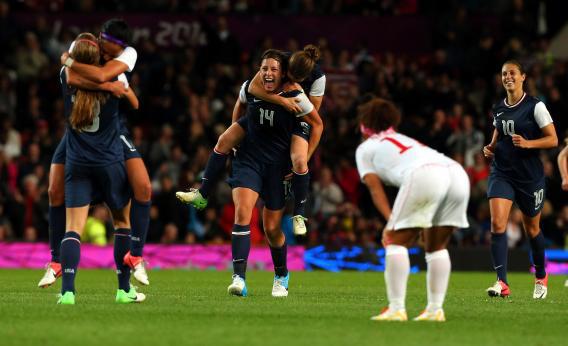Yesterday in Manchester, the U.S. women’s soccer team fought back from 1-0, 2-1, and 3-2 deficits to score a courageous, remarkable 4-3 victory over Canada on Alex Morgan’s header with 30 seconds left in extra time. Unless you’re Canadian, in which case you may have had a different perspective on the Olympic semifinal match. “It’s a shame in a game like that, which is so important, that the ref decided the result before the game started,” said Christine Sinclair, who scored all three goals for Team Canada. “It felt like it was America and the referee against us,” declared the losing side’s coach John Herdman.
Our neighbors to the north were enraged about a sequence of calls late in the second half. With the northerners up 3-2, referee Christiana Pedersen whistled Canadian goalkeeper Erin McLeod for holding on to the ball for more than six seconds, giving the Americans an indirect free kick inside the penalty area. On that free kick, the ball ricocheted off the arm of Canada’s Marie-Eve Nault. Pedersen called a hand ball and a penalty kick for the United States, which Abby Wambach knocked in to tie the game 3-3.
Though the hand ball could’ve gone either way, that six-second call looked highly dubious whether or not you own any maple-leaf-strewn apparel. Though the anti-time-wasting legislation is in FIFA’s rulebook, goalkeepers are rarely called for dilly-dallying—U.S. coach Pia Sundhage said after the match that she’d never seen it before. Ask a Soccer Referee, a Q-and-A site where answers are “coordinated with and approved by the U.S. Soccer Federation’s National Referee Program,” notes that “the offense is trivial as long as you are seeing an honest effort to put the ball back into play. We also recommend that the referee warn the ‘keeper about the time on the first offense before we do anything more about it.” McLeod says she was not warned. “I think the referee was very one-sided,” the goalkeeper said. “I think it’s unfortunate the calls went the way that they did. Of course, the Americans are a great soccer team, and today we were better, and the luck went their way.” [Clarification, Aug. 8: According to the AP, “McLeod said she was told by a linesman at the start of the second half not to slow down play, but didn’t consider that a proper warning.” The USA’s Abby Wambach, by contrast, said she did see the referee warn McLeod.]
No matter the sport, no matter the year, terrible refereeing is an Olympic tradition. The sad thing for the Canadians is that they played well enough against their perpetual nemesis—they haven’t beaten the American women in 11 years—for Monday’s bad call to affect the outcome. But the fact that the game was so tightly contested is a great thing for women’s soccer, a sport that was more about coronation than competition in the first stage of its existence.
In the 1990s heyday of Mia Hamm, Julie Foudy, and Brandi Chastain, there were two or three teams worldwide that could push the United States. In the era of Wambach and Morgan and Hope Solo, there are a whole lot more. Women’s soccer—unlike women’s basketball, where Team USA has won 39 straight Olympic games—is no longer a venue for the display of American superiority. The U.S. women could lose at any time, which makes the sport more interesting to watch and gives players like Wambach and Morgan more opportunities to do what stars do—win close, brutally exhausting games in the final moments.
The leveling of the playing field has also shifted the conversation that surrounds the sport. Rather than addressing them as heroes and pioneers and role models, we now talk about the U.S. women like they’re any other athletes. This transition will be an occasionally rocky one, as seen when Solo took umbrage at Chastain’s harsh criticisms of the national team’s play. But when Canada talks about being robbed by the refs, and when the United States did the same after last year’s World Cup match against Brazil, that’s a sign of fitful progress. Players and fans alike complain about the refs in football, basketball, baseball, and every other sport that’s ever existed. Canadian women’s soccer backers, welcome to the club. This is what the best sports look like—occasionally uplifting, often infuriating, and always worth watching.
